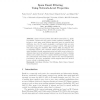Free Online Productivity Tools
i2Speak
i2Symbol
i2OCR
iTex2Img
iWeb2Print
iWeb2Shot
i2Type
iPdf2Split
iPdf2Merge
i2Bopomofo
i2Arabic
i2Style
i2Image
i2PDF
iLatex2Rtf
Sci2ools
137
click to vote
INCDM
2010
Springer
2010
Springer
Spam Email Filtering Using Network-Level Properties
Abstract. Spam is serious problem that affects email users (e.g. phishing attacks, viruses and time spent reading unwanted messages). We propose a novel spam email filtering approach based on network-level attributes (e.g. the IP sender geographic coordinates) that are more persistent in time when compared to message content. This approach was tested using two classifiers, Naive Bayes (NB) and Support Vector Machines (SVM), and compared against bag-of-words models and eight blacklists. Several experiments were held with recent collected legitimate (ham) and non legitimate (spam) messages, in order to simulate distinct user profiles from two countries (USA and Portugal). Overall, the network-level based SVM model achieved the best discriminatory performance. Moreover, preliminary results suggests that such method is more robust to phishing attacks.
Data Mining | INCDM 2010 | Network-level Attributes | Network-level Based Svm | Sender Geographic Coordinates |
Related Content
| Added | 30 Aug 2010 |
| Updated | 30 Aug 2010 |
| Type | Conference |
| Year | 2010 |
| Where | INCDM |
| Authors | Paulo Cortez, André Correia, Pedro Sousa, Miguel Rocha, Miguel Rio |
Comments (0)

